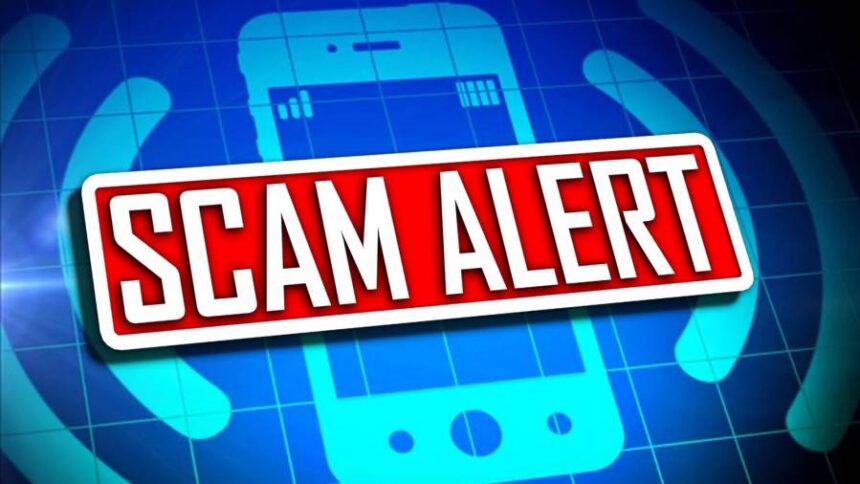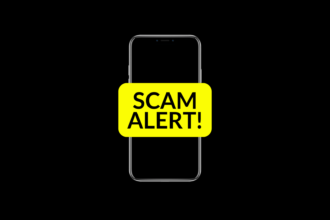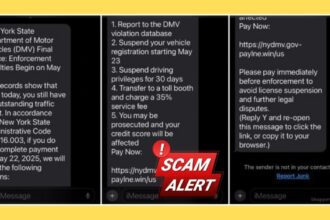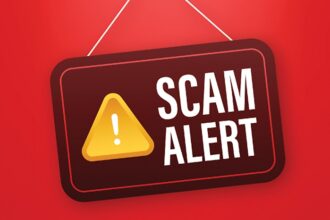South Carolina residents are increasingly being targeted by sophisticated text message scams claiming to be from the South Carolina Department of Motor Vehicles (SCDMV). These fraudulent messages demand payment for supposed “unpaid tolls” and threaten severe consequences if recipients don’t comply immediately. The SCDMV scam has become so widespread that the agency itself has issued an official warning on social media, alerting residents that these messages are not affiliated with the department and are attempted scams.
What makes these scams particularly notable in South Carolina? The SCDMV does not collect toll fees or contact customers about fines for toll violations.
Official Warning from the South Carolina DMV (SCDMV)
The South Carolina Department of Motor Vehicles has issued a formal warning about these fraudulent messages on its official Facebook page. The SCDMV explicitly stated: “Please be aware of any text messages or communications claiming to be from the #SCDMV for the purpose of collecting fines for toll violations. The DMV does not collect toll fees or contact customers about fines for toll violations. Any such message is not affiliated with the #SCDMV and is an attempted scam.”
The agency also reminded residents that its only official website is www.scdmvonline.com, and any deviation from this main site address is not legitimate. This warning comes as multiple South Carolina residents report receiving texts claiming to be from the SCDMV regarding unpaid toll violations.
This SCDMV scam aligns with a nationwide trend of similar scams targeting residents in multiple states. Transportation authorities in Michigan, Kentucky, North Carolina, Ohio, Florida, and other states have issued similar alerts about toll-related text scams in recent months, indicating this is part of a coordinated nationwide phishing campaign.
Overview of the SCDMV Toll Violation Notice Scam
The SCDMV toll violation notice scam is a sophisticated phishing attempt designed to steal personal and financial information from unsuspecting victims. Scammers send text messages claiming to be from the South Carolina Department of Motor Vehicles about unpaid toll violations, often using official-looking terminology and threats of severe penalties to create urgency. These messages direct recipients to fraudulent websites designed to capture sensitive information.
What makes these SCDMVonline toll payment scams particularly concerning is their increasing sophistication. Recent versions include fake websites that mimic official government pages with remarkable accuracy. The scammers create convincing replicas of government payment portals, complete with official-looking logos, color schemes, and layouts.
The scam exploits public familiarity with government agencies and toll systems, even though the SCDMV does not actually handle toll violations in South Carolina. Genuine toll operations in South Carolina are handled by specific authorities like the Southern Connector or Cross Island Parkway systems, and legitimate toll violations are communicated through official mail, never via urgent text messages demanding immediate payment under threat of severe penalties.
How the SCDMVOnline Toll Payment Scam Works
The SCDMV toll scam follows a calculated pattern designed to create urgency and fear while harvesting sensitive information:
- Initial Contact: Victims receive an unsolicited text message claiming to be from the SCDMV about unpaid toll violations. The message may appear to come from an international phone number, often from the Philippines (+63 country code).
- False Urgency: The message creates immediate stress by using phrases like “final notice” and “immediate action required,” typically giving only 12 hours to respond before severe consequences.
- Specific but Small Amount: To appear legitimate, the scam typically cites a relatively small, specific amount (like $6.99) that seems plausible enough not to raise immediate suspicion.
- Severe Threats: The message threatens disproportionate penalties, including:
- Immediate late payment fees
- Suspension of vehicle registration
- Negative credit reporting
- Collection actions
- Possible vehicle impoundment
- Deceptive Links: The text includes a link that appears official but directs to a fraudulent website. These domains often use variations that include “scdmv” but with additional elements (like scdmv.onlinewta.vip/pay).
- Unusual Instructions: Many versions ask recipients to reply “Y” or perform specific actions like exiting and reopening their messaging app to “activate” the link, which serves to confirm that the phone number belongs to an active user.
- Data Theft: If a victim clicks the link and enters their information, scammers capture sensitive data including credit card details, security codes, and personal information that can be used for identity theft or fraudulent charges.
Security experts have noted that these scams aren’t just about stealing one-time payments. The information collected is often used for more extensive fraud operations, including adding victims’ credit cards to mobile wallets on stolen devices, enabling ongoing unauthorized transactions.
Text Message Patterns and Red Flags
The fraudulent SCDMV toll texts follow recognizable patterns. A typical message might read:
Toll Violation Notice: This is your final notice regarding the unpaid toll balance on your account. You must settle the balance within the next 12 hours to avoid severe penalties. Unpaid Balance: $6.99 Due Date: April 30, 2025 Failure to pay within this time frame will result in the following:
1. Immediate addition of late payment fees to your balance
2. Suspension of your vehicle registration by the Department of Motor Vehicles (DMV)
3. Collection actions, including a negative report to your credit file Please make your payment promptly to avoid these severe consequences and protect your driving privileges.
Pay Now: [Malicious Link]
If the link fails, reply with ‘Y’, exit the SMS, and reopen it to activate the link, or copy and paste it directly into your browser to complete your payment. This is your last opportunity. Pay now to avoid irreversible consequences.
Common Elements in SCDMV Scam Texts:
- Urgent Language: Terms like “Final Notice,” “Immediate Action Required,” “Final Remeber” and “Last Opportunity”
- Severe Threats: Mentions of registration suspension, credit damage, and even vehicle impoundment
- Specific Small Amount: Usually under $10, making it seem more plausible to pay without questioning
- Very Short Deadlines: Typically gives only 12 hours to respond
- Unusual Technical Instructions: Instructions to reply “Y” and exit/reopen messages are not typical of legitimate government communications
Red Flags in the Link and Website:
- Non-governmental Domains: Legitimate SC government websites use “.gov” or specific approved domains like “scdmvonline.com”
- Additional Characters: Look for unusual additions to otherwise official-looking domain names (like “onlinewta.vip”)
- Unusual Extensions: Instead of “.gov” or “.com,” scam sites may use unusual extensions like “.vip,” “.top,” or “.cc”
- International Phone Numbers: Many of these texts come from international numbers, particularly with the +63 (Philippines) country code
How to Identify an Fake SCDMV Toll Violation Text
To protect yourself from the SCDMV toll scam, be alert to these key indicators:
1. Agency Responsibility
The most obvious red flag is that the SCDMV does not handle toll violations. As the agency has officially confirmed, “The DMV does not collect toll fees or contact customers about fines for toll violations.” Any message claiming to be from the SCDMV about toll violations is automatically suspicious.
2. Communication Method
Legitimate government notices about violations or fees are almost always sent through official mail with proper letterhead and specific details. Government agencies rarely initiate contact through text messages, especially for payment collection.
3. Website Verification
The SCDMV has emphasized that its only official website is www.scdmvonline.com. Any other variations claiming to be SCDMV websites are fraudulent. Always check the URL carefully before entering any information online:
- Legitimate SCDMV website: www.scdmvonline.com
- Fraudulent examples:
- scdmv.onlinewta.vip
- scdmv-payment.com
- scdmvonline.cc
- Any site with unusual extensions or additional characters
4. SCDMV Phone Number Verification
If you need to contact the SCDMV, use only the official SCDMV phone number: (803) 896-5000. Never call phone numbers provided in unsolicited text messages claiming to be from the SCDMV. The official SCDMV phone number is available on their legitimate website.
5. Unreasonable Urgency
Legitimate government communications provide reasonable timeframes for response. The 12-hour deadline commonly seen in these scam messages is unreasonably short and designed to pressure recipients into acting without due consideration.
6. Language and Tone
Government communications are typically formal and informative, not threatening. Excessive threats about severe consequences for a small toll violation should raise immediate suspicion.
Protecting Yourself from these Unpaid Toll Violation Notice Scam
If you receive a text message claiming to be from the SCDMV about unpaid tolls, follow these guidelines to protect yourself:
1. Never Click on Links in Unsolicited Messages
- Do not click on any links in unexpected text messages
- Do not reply to the message, even to say “STOP” or “NO”
- Do not call numbers provided in the message
Instead, if you’re concerned about a potential toll violation:
- Contact the specific toll road authority directly using their official contact information
- For general inquiries, contact the SCDMV through its official website (www.scdmvonline.com) or official SCDMV phone number (803-896-5000)
2. Report the Scam
- Forward suspicious texts to SPAM (7726)
- Report to the Federal Trade Commission at ReportFraud.ftc.gov
- File a complaint with the FBI’s Internet Crime Complaint Center at www.ic3.gov
- Report the message to the SCDMV through official channels
3. If You’ve Already Responded
If you’ve already clicked on links or provided information:
- Contact your bank or credit card company immediately to report potential fraud
- Cancel any cards whose information you entered on suspicious websites
- Monitor your accounts closely for unauthorized transactions
- Consider placing a fraud alert on your credit reports with all three major credit bureaus
- Change passwords for any potentially compromised accounts
4. Use Built-in Security Features
- Enable spam-blocking tools on your mobile device
- Consider using call-blocking apps designed to filter scam texts and calls
- Keep your phone’s operating system updated with the latest security patches
Frequently Asked Questions
1. Is the SCDMV Unpaid Toll Violation Notice Text Legitimate?
No. The SCDMV has officially confirmed they do not collect toll fees or contact customers about fines for toll violations. Any text message claiming to be from the SCDMV regarding toll violations is fraudulent. The SCDMVonline toll payment scam is a known phishing attempt.
2. Does the SCDMV Handle Toll Roads in South Carolina?
No. The SCDMV (South Carolina Department of Motor Vehicles) is responsible for driver’s licenses, vehicle registrations, and related services. It does not operate toll roads or collect toll payments. Toll operations in South Carolina are handled by specific authorities depending on the toll road or facility.
3. What Should I Do If I’ve Already Paid a Fake SCDMV Toll Notice?
If you’ve already provided payment information to a scam:
- Contact your bank or credit card company immediately to report fraud
- Dispute any unauthorized charges
- Request a new card with a different number
- Monitor your accounts closely for additional unauthorized charges
- File a police report
- Report the fraud to the FTC and FBI’s Internet Crime Complaint Center
- Consider placing a freeze on your credit reports with the major credit bureaus
4. Can My Vehicle Registration Really Be Suspended for Unpaid Tolls?
While there can be consequences for legitimately unpaid tolls after due process, the extreme and immediate threats in SCDMV scam messages are greatly exaggerated to create fear. Legitimate violations would follow a legal process that includes multiple notifications through official channels (typically mail, not text) and reasonable timeframes for resolution before any action affecting your registration would be taken.
5. How Can I Contact the Real SCDMV with Questions?
To contact the legitimate SCDMV:
- Visit the official website: www.scdmvonline.com
- Call the official SCDMV phone number: (803) 896-5000
- Visit an SCDMV branch in person
- Send mail to: SCDMV, P.O. Box 1498, Blythewood, SC 29016
Never use contact information provided in unsolicited text messages claiming to be from the SCDMV.
Conclusion: Staying Vigilant Against Fraudulent SCDMV Texts
The SCDMV toll violation scam represents a concerning trend in how scammers are adapting their techniques to appear more legitimate. By impersonating government agencies like the SCDMV, scammers attempt to exploit public trust to steal personal and financial information.
The South Carolina Department of Motor Vehicles has been proactive in warning residents about these fraudulent messages, emphasizing that they do not collect toll fees or contact customers about toll violations. This official confirmation makes identifying these scams straightforward: any message claiming to be from the SCDMV about toll violations is fraudulent.
As these scams continue to evolve, the best protection remains awareness and skepticism. Before responding to any unexpected message about government fees or violations, verify through official channels using contact information obtained from legitimate sources.
By staying informed and cautious, South Carolina residents can protect themselves from becoming victims of the SCDMV scam. Remember that taking a moment to verify before responding can save significant financial and personal hardship in the long run. If you’re unsure about a communication regarding tolls, contact the specific toll authority or the SCDMV directly through their official contact channels rather than responding to the message itself.









































